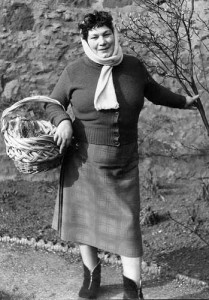Jeannie Robertson is a monumental figure in Scottish traditional song whose influence and importance as a preserver of folklore will sustain for as long as traditional ballads are sung.
Regina Christina Robertson was born into a traveller family in Aberdeen on October 21, 1908. Her father, Donald, who died a year later, was a piper and her mother, Maria, was a singer with a vast store of songs and stories.
There was music going back generations on both sides of the family and as Jeannie grew up in the traveller life, spending six months of the year in Aberdeen and spring and summer on the roads up Deeside and down Donside, there were musical gatherings round both hearthside and campsite. Music wasn’t just entertainment. The songs and stories formed guides to traveller history and lessons in life.
Jeannie began to learn songs in earnest during the First World War. Her stepfather, James Higgins, and brothers William, Robert and David had been called up and Jeannie’s mother couldn’t sleep through worry. So Maria and her brother would sing into the early hours to take their minds off the war.
Jeannie listened as Maria told the story behind each song before singing it, a practice that as she grew into womanhood gave Jeannie’s singing such authority. It wasn’t long before Jeannie earned her first fee as her maternal grandfather, who was renowned as a fine singer himself, loved to listen to her singing and would give her a shilling for a song.
When, in 1953, folklorist Hamish Henderson visited Aberdeen, looking for traditional singers and collecting songs, Bobby Hutchinson, who had often attended ceilidhs at Jeannie and her husband, Donald Higgins’ Causewayend flat, pointed him in Jeannie’s direction.
So began Jeannie’s transition from a singer who sang at family gatherings and to relieve the stresses of a hard life into a tradition bearer of international standing.
The American folklorist Alan Lomax, like Henderson, recognised the immense wealth of Jeannie’s song store and Jeannie was soon invited to sing at the Third People’s Ceilidh at Edinburgh Festival and to record for the BBC in London.
She sang in folk clubs and at festivals and recorded for Topic Records’ songs and ballads series, and her home became an open house for folklore students and young singers eager to learn from this living source of folksong.
Some of the songs Jeannie sang weren’t quite as old as her callers suspected, as she often made up songs of her own while doing her housework. Her singing of ballads including her most celebrated song, Son David, and the Battle of Harlaw was, however, the long oral tradition at work and she gave battle songs added realism through visualising swords clashing and men falling as she sang.
In 1968, Jeannie was appointed MBE for services to folksong, an event made all the more significant since she was the first folksinger and the first traveller to receive this honour. She died in March 1975 having passed on her songs to students including her daughter Lizzie Higgins, her nephew Stanley Robertson, Ray Fisher, Andy Hunter, and Jean Redpath, and having enriched the lives of everyone who heard her sing.
